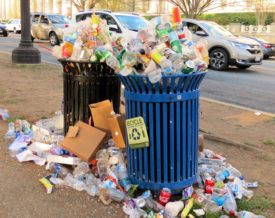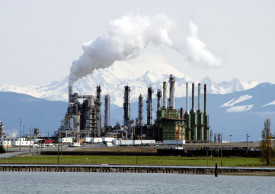 The Seattle Times is opposing an increase to Washington’s hazardous substance tax, for two reasons:
The Seattle Times is opposing an increase to Washington’s hazardous substance tax, for two reasons:
- The tax applies to hazardous substances that are manufactured in Washington but sold out-of-state;
- In the next couple of years, not all of the money will go to clean up pollution.
Let’s take these one at a time.
First, the reason it’s a good idea to tax hazardous substances manufactured in Washington is because they tend to harm Washington. Texas-based Tesoro Corporation, which operates a refinery near Anacortes, is a major opponent of a bill that would increase the tax, in large part because the company is one of the state’s major polluters. They argue that paying a higher pollution tax in Washington would put them at a competitive disadvantage when they sell their products out of state.
But consider that just earlier this week Tesoro was slapped with a huge lawsuit by the Justice Department and the Environmental Protection Agency. It turns out that Tesoro’s Anacortes facility, as well as several others, was not even bothering to test for important types of air pollution such as benzene, sulfur, and other toxics. In other words, the federal Clean Air Act violations that Tesoro allegedly committed in Washington will harm Washington, regardless of where their customers live.
What’s more, the competitive disadvantage argument should be taken with a grain of salt—or perhaps an entire shaker’s worth. All Washington refiners would be subject to exactly the same tax rate — just as they are now—keeping the playing field level for local producers. Moreover, the refined product that Tesoro sells out of state mostly goes into Oregon (and parts of Idaho) where there are no refineries. The only logical competition tends to come from refineries in California. And not only is it geographically impractical for California refiners to supply the major population centers that Washinton refiners currently supply, but the taxes and fees on petroleum products in California are arguably higher than they are in Washington.
Second, the bill stipulates that all of the hazardous substance tax—including 100 percent of the proposed increase — will go entirely to pollution clean-up by 2016. It’s true that in the interim years, a portion of the revenue will be directed to the general fund, but I have a tough time seeing how this is a problem. If a modest tax — 0.7 percent rising to 2 percent — on toxic products pays for schools, public safety, state parks, and social services, I’m frankly not going to get too worked up about it. In any event, it seems that the Times objection really vanishes by 2016, and is attenuated even in the earlier years by the increasing share of the tax revenue dedicated for pollution clean-up.
No doubt, there are also some very substantial pollution clean-up needs in Washington, especially for stormwater runoff. (Sightline has recently written quite a bit about cost-effective stormwater clean-up.) In particular, there is a crying need for additional funding to address the deficit of stormwater infrastructure that many localities face. Yet in the near-term, the state faces draconian budget cuts that will fall hardest on those who are struggling most. Using a share of the hazardous substance money to shore up the general fund temporarily is probably an excellent idea. And as the economy recovers, and the state budget revives, Washington residents will benefit from a more significant fund to clean up the streams, lakes, and salt water that we prize.
On that score, and to show that I’m not bashing the Times, I should mention that columnist Lance Dickie has a thoughtful column that also ran yesterday. Definitely worth a read.









charlie weisss
Eric—The idea that the gov’t is “protecting polluters” goes far beyond Tesoro, Puget Sound, or Washington. Oregon’s appalling “toxics mixing zones” in the Willamette River is but one example. Mary Wood (U of Oregon law professor) has a take on this concept, known in legal circles as “public trust”, where the government is explicitly responsible for protecting common, or public assets. See http://www.democratherald.com/news/local/article_333fd754-19d2-5431-82f2-3532df172d73.html. The gov’t’s failing, by finding clever ways to accommodate polluters’ “rights” to pollute. I’d like to see if someone’s gone deeply into this question. For now, let’s say from the gov’t’s perspective, protecting polluters has been one of its priorities. Any ideas how to stop this practice in its tracks would be most welcome. Readers?
Nate James
And what happens to tax revenue if Tesoro decides to shut down the refinery in Anacortes? How much will the sate/city lose all in pursuit for more tax money to feed the gov’t machine? Like it or not, they’re in business to make a profit not be the states penny bank. They lost over $100 million last year. They may cut their losses and leave. How many families will be out of work? How much money will Washington and Anacortes lose in tax revenue? I care because I live in Anacortes. You don’t care.Of course you’ll probably say it’s unlikely, it’s just false posturing. It’s only fair they pay more. After all they’re the evil big business. Forget the fact they provide the salaries that keep people fed, clothed and housed. Right?